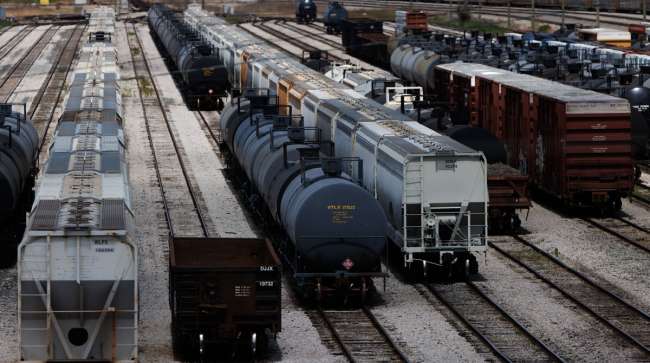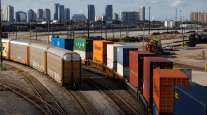Staff Reporter
CN and CPKC Initiate Lockout After Labor Talks Fail

[Stay on top of transportation news: Get TTNews in your inbox.]
The Canadian railway system has been struck with two major work stoppages amid failed labor negotiations Aug. 22.
Canadian National Railway Co. and Canadian Pacific Kansas City had both issued lockout notices to their workers affiliated with the Teamsters Canada Rail Conference. This means a massive work stoppage would occur if the two sides failed to reach a labor agreement by midnight on Aug. 22.
“The union did not respond to another offer by CN in a final attempt to avoid a labor disruption,” Canadian National said in a statement. “This offer improved wages and would have seen employees work less days in a month by aligning hours of service in the collective agreement with federally mandated rest provisions. The offer also proposed a pilot project for hourly rates and scheduled shifts on a portion of the network.”
Canadian National added that it had no choice but to finalize a safe and orderly shutdown without an agreement or binding arbitration. CPKC echoed much of the same sentiment.
RELATED: US Shippers Scramble as Canadian Rail Shutdown Hits Freight
“CPKC has bargained in good faith, but despite our best efforts, it is clear that a negotiated outcome with the TCRC is not within reach,” CPKC said in a statement. “The TCRC leadership continues to make unrealistic demands that would fundamentally impair the railway’s ability to serve our customers with a reliable and cost-competitive transportation service.”
TCRC said the lockouts occurred despite months of good-faith negotiations. The union put forward multiple proposals in recent days, all rejected by the companies. According to TCRC, company leadership demands remain the main obstacle to an agreement.
“Throughout this process, CN and CPKC have shown themselves willing to compromise rail safety and tear families apart to earn an extra buck,” TCRC President Paul Boucher said. “The railroads don’t care about farmers, small businesses, supply chains or their own employees. Their sole focus is boosting their bottom line, even if it means jeopardizing the entire economy.”
Cox Automotive's Kevin Clark discusses how dynamic parts management can transform your fleet services. Tune in above or by going to RoadSigns.ttnews.com.
The Canada Industrial Relations Board paved the way for a railway worker strike with an Aug. 9 decision, finding that unionized railway workers could strike without posing an immediate threat to public health and safety. The ruling did include a 13-day cooling-off period before a work stoppage could occur. The negotiations have also been assisted by federal mediators, who have been unable to bridge the two sides.
CPKC announced its lockout plans Aug. 9. The company asserted that the union would be to blame if an agreement could not be reached in time after it refused a binding interest arbitration process to overcome their disagreements. TCRC responded by serving a strike notice. CN later issued its own lockout notice Aug. 18.
The railway companies prepared for a potential work stoppage by progressively shutting down their networks. CN said the threat of an unpredictable strike necessitated its network shutdown. The company added the plan was to ensure the safety of communities and goods and optimize recovery. CPKC said its shutdown notice was to mitigate uncertainty so that customers could prepare.
The Canadian Federation of Independent Business called on government officials to take immediate action in the lead up to the work stoppages. The business association urged the minister of labor to refer the dispute to the CIRB for binding arbitration and prohibit a strike or lockout.
“Alternatively, the government can also reconvene Parliament and introduce back-to-work legislation,” CFIB said in a statement Aug. 21. “This is not about siding with either party; it is about standing up for Canadians. The federal government must show leadership and act before our trains — and with them, our economy — grind to a halt. Otherwise, the steep price of inaction will be paid by Canadian families, workers and businesses.”
RELATED: Labor Minister Not Intervening in Canada Rail Dispute
CN and CPKC transport about $1 billion worth of freight across 40,000 carloads daily. Any extended disruption threatens to severely hamper cross-border commerce. The affected cargo spans a wide range, including vehicles, automotive components, chemical products, lumber and farm produce.
Want more news? Listen to today's daily briefing below or go here for more info:




